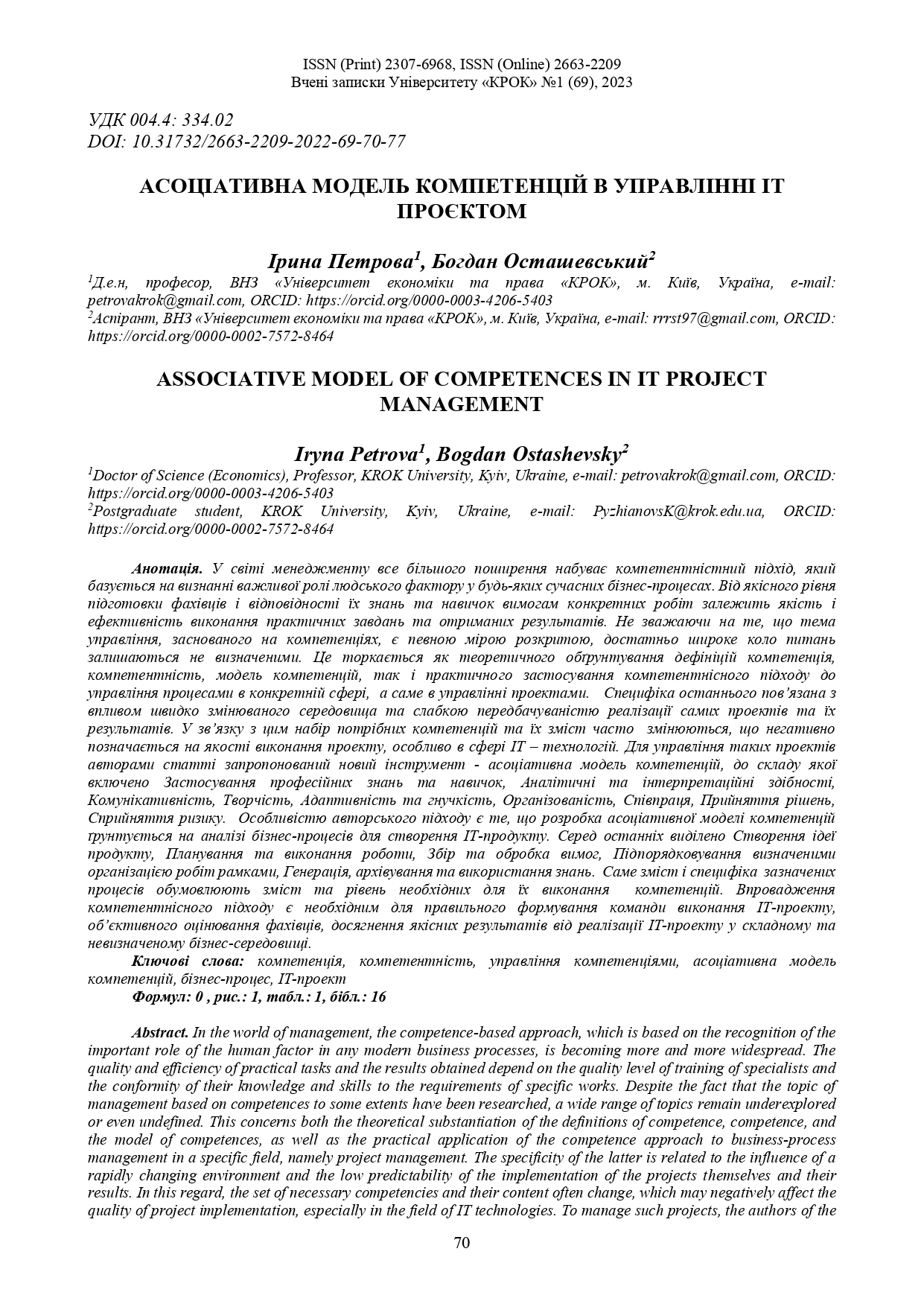ASSOCIATIVE MODEL OF COMPETENCES IN IT PROJECT MANAGEMENT
DOI:
https://doi.org/10.31732/2663-2209-2022-69-70-77Keywords:
competence, competency, competence management, associative competence model, business process, IT projectAbstract
In the world of management, the competence-based approach, which is based on the recognition of the important role of the human factor in any modern business processes, is becoming more and more widespread. The quality and efficiency of practical tasks and the results obtained depend on the quality level of training of specialists and the conformity of their knowledge and skills to the requirements of specific works. Despite the fact that the topic of management based on competences to some extents have been researched, a wide range of topics remain underexplored or even undefined. This concerns both the theoretical substantiation of the definitions of competence, competence, and the model of competences, as well as the practical application of the competence approach to business-process management in a specific field, namely project management. The specificity of the latter is related to the influence of a rapidly changing environment and the low predictability of the implementation of the projects themselves and their results. In this regard, the set of necessary competencies and their content often change, which may negatively affect the quality of project implementation, especially in the field of IT technologies. To manage such projects, the authors of the article proposed a new tool - an associative model of competencies, which includes Application of professional knowledge and skills, Analytical and interpretive abilities, Communicativeness, Creativity, Adaptability and flexibility, Organization, Cooperation, Decision-making, Risk perception. The peculiarity of the author's approach is that the development of an associative model of competencies is based on the analysis of business processes for the creation of an IT product. Among the latter, the creation of a product idea, planning and execution of work, collection and processing of requirements, subordinating work to the framework defined by the organization, generation, archiving and use of knowledge are highlighted. It is the content and specificity of these processes that determine the content and level of competences necessary for their implementation. The implementation of the competence approach is necessary for the correct formation of the IT project implementation team, the objective assessment of specialists, and the achievement of quality results from the implementation of the IT project in a complex and uncertain business environment.
Downloads
References
OMG Essence 1.2. URL:https://www.omg.org/spec/Essence/1.2/PDF
A guide to the project management body of knowledge (PMBOK guide) / Project Management Institute.
Осташевський, Б. В. (2020). УПРАВЛІННЯ ЗНАННЯМИ ЯК ІНСТРУМЕНТ ФОРМАЛІЗАЦІЇ ПРОЦЕСІВ ПРОЕКТУ В УМОВАХ НЕВИЗНАЧЕНОСТІ. Вчені записки Університету «КРОК», (1 (57), 125–131. https://doi.org/10.31732/2663-2209-2020-57-125-131.
Kurz R., Bartram D. Competency and individual performance: Modeling the world of work. 2002.
Дейнека. А.В. (2013). Управление человеческими ресурсами.
McClelland D.C. (1973). Testing for Competence Rather Than for Intelligence. American Psychologist, 28 (1): 1-14.
Klemp, G.O. (1980). The assessment of occupational competence. Washington, D.C.: Report of the National Institute of Education.
Spencer L. & Spencer S. (1993). Competence at Work: Model for Superior Performance. John Wiley & Sons, New York.
Dubois D. (1998). Competency-based HR Management. Black Well Publishing.
Chouhan, V. & Srivastava, S. (2014). Understanding Competencies and Competency Modeling — A Literature Survey. IOSR Journal of Business and Management.
Davis Z. (2021). The 2022 State of IT. URL: https://swzd.com/resources/state-of-it
Петрова, І. (2020). РИЗИК-ОРІЄНТОВАНЕ УПРАВЛІННЯ ЯК СОЦІАЛЬНА ІННОВАЦІЯ У ЗАБЕЗПЕЧЕННІ ЕКОНОМІЧНОЇ БЕЗПЕКИ. Вчені записки Університету «КРОК», (3 (59), 243–248. https://doi.org/10.31732/2663-2209-2020-59-243-248.
Петрова І.Л. (2008). Інтеграційна роль компетенцій у стратегічному управлінні людськими ресурсами. Україна: аспекти праці, №8, с.23-28.
Поскрипко, Ю. А., & Данченко, О. Б. (2019). КОМПЕТЕНЦІЯ І КОМПЕТЕНТНІСТЬ: КОНСЕНСУС. Вчені записки Університету «КРОК», ((3) 55), 117–127. https://doi.org/10.31732/2663-2209-2019-55-117-127.
Закон України «Про вищу освіту». Режим доступу: https://zakon.rada.gov.ua/go/1556-18
Слюсарчук, Ю., Джавала, Л., Угрин, Л. Компетентністний підхід до підготовки ІТ – фахівців на основі проектного навчання. – Режим доступу: https://www.google.com.conf.ztu.edu.ua

Downloads
Published
How to Cite
Issue
Section
License

This work is licensed under a Creative Commons Attribution-NonCommercial 4.0 International License.

